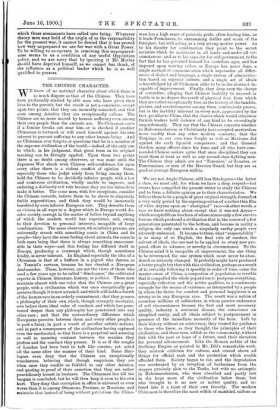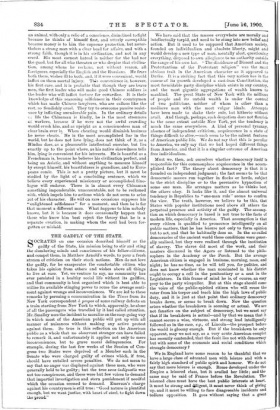THE CHINESE CHARACTER.
WE know of no national character about which there is so much dispute as that of the Chinese. They have been profoundly studied by able men who have given their lives to the pursuit, but the result is not a consensus, except upon two points, that they are incurably conceited, and that even among Asiatics they are exceptionally callous. The Chinese are no more moved by human suffering even among their own people than the animals are. No Chinaman cares if a famine breaks out near him, or is shocked if another Chinaman is tortured, or will exert himself against his own interest to prevent suffering to any other human being. And no Chinaman ever forgets or questions that he is a member of the supreme civilisation of the world,—indeed, of the only one to which, in his judgment, that great term in its original meaning can be fittingly applied. Upon these two points there is no doubt among observers, or was none until the Japanese War shook even Chinese self-confidence, but upon every other there is a violent conflict of opinion. Some, especially those who judge solely from living among them, hold the Chinese to be decidedly inferior people, with a low and cumbrous civilisation, wholly unable to improve, and enduring a distinctly evil rule because they are too imbecile to make it better. The same men, with few exceptions, consider the Chinese cowards, believe them to be slaves to singularly feeble superstitions, and think they would be immensely benefited by even inferior European rule. They describe them as vicious in all ways to a degree which in Europe would dis- solve society, corrupt in the matter of bribes beyond anything of which the modern world has experience, and, owing to their devotion to personal interests, incapable of large combinations. The same observers, when inferior persons, are universally struck with something comic in China and its people—they have the same feeling about animals, the cause in both cases being that there is always something unaccount- able in their ways—and this feeling has diffused itself in Europe, producing a contempt which, though sometimes kindly, is never tolerant. In England especially the idea of a Chinaman is that of a buffoon in a pigtail who dances, as in Tenniel's cartoon, because he has cheated a European Ambassador. These, however, are not the views of those who used a few years ago to be called*" Sinolognes," the cultivated experts in Chinese literature, history, or politics. These men maintain almost with one voice that the Chinese are a great people, with a civilisation which was once energetically pro- gressive though it is now arrested, and which still holds a fourth of the human race in an orderly contentment; that they possess a phildsophy of their own which, though strangely secularist, sets before them ideal rules of conduct, and which has pene- trated deeper than any philosophy has penetrated into any other race; and that the extraordinary difference which Europeans perceive between them and every other people is in part a fancy, in part a result of peculiar artistic notions, and in part a consequence of the civilisation having captured even the uneducated, so that there is a perpetual and amazing as well as amusing contrast between the maxims they profess and the conduct they pursue. It is as if the roughs of London had been bred to talk like curates, yet acted all the same after the manner of their kind. Some Sino- logues even deny that the Chinese are exceptionally treacherous, believing that though suspicious, they are when once they confide as faithful as any other Asiatics, and quoting in proof of their assertion that they are rather punctiliously honest in business. The Chinaman lies till the bargain is concluded, but he will then keep it even to his own hurt. They deny that corruption in office is universal or even worse than it is among Ottomans, Persians, or Russians, and maintain that instead of being without patriotism the China- man has a high sense of patriotic pride, often leading him, as it leads Frenchmen, to unreasoning dislike and scorn of the foreigner, but still acting as a very strong motive power. As to his faculty for combination, they point to the secret societies which he maintains in all lands and under all cir- cumstances; and as to his capacity for self-government, to the fact that he has governed himself for countless ages, and has imposed upon warring tribes, as Europe has never done, a single method of communication which supersedes all differ- ences of dialect and language, a single system of administra- tion based on superior culture, and a single set of ideals acknowledged by all Chinamen alike to be in the abstract in- capable of improvement. Finally, they deny even the charge of cowardice, alleging that Chinese inability to succeed in battle is in no degree the result of physical fear, from which they are rather exceptionally free, as the history of the bandits, pirates, and revolutionaries among them conclusively proves, but is the inability inherent in every mob, aggravated by the fact, peculiar to China, that the classes which would otherwise furnish leaders hold violence of any kind to be exceedingly ungentlemanly. They say that the Chinese converts whether to Mahommedanism or Christianity have accepted martyrdom more readily than any other modern converts ; that the Taepings in our own time fought as well as Mexicans did against the early Spanish conquerors; and that General Gordon, many officers since his time, and all who have com- manded Chinese sailors agree that once disciplined they can trust them at least as well as any second-class fighting men. The Chinese they admit are not " Tommies," or Zouaves, or Pomeranians, or men of the Russian Guard, but they are as good as average European militia.
We are not Anglo-Chinese, still less Sinologues—the latter a class, we must add, for whom we have a deep respect—but events have compelled the present writer to study the Chinese and to form a definite opinion as to their characteristics. We believe them to be a people of great original strength, formed at a very early period by the superimposition of a rather thin film of white Aryans upon an " aboriginal " race—in other words, a race we know nothing about except that it was not Aryan— which accepted from teachers of whose names only a few survive lessons which produced a civilisation that in the course of a few generations penetrated to the bottom, and became in reality a religion, the only one which a singularly earthy people ever sincerely embraced. It became to them what "respectability" is to many of us English, the final rule of conduct, the solvent of ideals, the one test to be applied to every new pro- posal, effort to advance, or novelty in circumstance. To the Chinese mind it is incapable of improvement, the one thing to be reverenced, the one system which must never be aban- doned or seriously changed. It probably might have produced a better people but that with this civilisation, perhaps as a result of it, certainly following it speedily in order of time, came the master-curse of China, a congestion of population so terrible that it compelled the whole population to postpone everything, especially reflection and the nobler qualities, to a continuous struggle for the means of existence, as interpreted by a people in whom the desire for comfort and personal happiness is as strong as in any European race. The result was a nation of countless millions of selfseekers, in whom passive endurance of evil circumstances became the first and most necessary quality, industry a universal disease, the conscience an atrophied entity, and all ideals subject to postponement in presence of the immediate necessity of the hour. Left by their history without an aristocracy, they turned for guidance to those who knew, as they thought, the principles of their civilisation, and these men, selfish as the commonalty, without link with the past or hope of a future, used their elevation for personal advancement. Like the Roman nobles of the declining Empire as painted in Mr. Dill's remarkable work, they mistook criticism for culture, and craved above all things for official rank and the protection which wealth afforded them. Society began to rot, and the degradation was accelerated by an irruption of barbarians from the steppes precisely akin to the Turks, but with no antiseptic in Mahommedanism, who were absorbed and partly lost in the huge mass of the civilisation below them, but who brought to it no new or nobler quality, and in- fused into it a taint of their own ferocity. The modern Chinaman is therefore the most selfish of mankind, callous as an animal, with only a relic of a conscience, disinclined to fight because he thinks of himself first, and utterly corruptible because money is to him the supreme protection, but never- theless a strong man with a clear head for affairs, and with a strong faith, though it is in his civilisation, and not in any creed. His most earnest hatred is neither for the bad nor the good, but for all who threaten or who despise that civilisa- tion, among whom he reckons, not without reason, all foreigners, especially the English and the Russians. He fears both these, wishes ill to both, and, if it were convenient, would inflict on them mortal injury. This convenience is, however, his first care, and it is probable that though they are brave men, the first leader who will make good Chinese soldiers is the leader who will inflict torture for cowardice. It is their knowledge of this reasoning selfishness in their countrymen which has made Chinese lawgivers, who are callous like the red, so fiendishly cruel. They try to overcome passive resist- ance by inflicting unendurable pain. In the ordinary details c. life the Chinaman is kindly, he is the most strenuous of workers, because if he were not the awful crowding would crush him, and as upright as a conscienceless man of clear brain ever is. When cheating would diminish business he never cheats. He is the most accomplished liar in the world, but he does not love lying, does not think of it, as a Hindoo does, as a pleasurable intellectual exercise, but lies exactly up to the point where, as his native shrewdness tells him, lying is convenient for his interests. He is boastful as a Frenchman is, because he believes his civilisation perfect, and being an Asiatic, and without anything to measure himself by except himself, his boastfulness is grandiose, and to Euro- peans comic. This is not a pretty picture, but it must be studied by the light of a concluding sentence, which we believe every experienced missionary or accomplished Sino- logue will endorse. There is in almost every Chinaman something imponderable, unaccountable, not to be reckoned with, which impels him to actions which do not seem to arise out of his character. He will on rare occasions suppress his "enlightened selfishness" for a moment, and then he is for that moment a different man. What happens to him nobody knows, but it is because it does occasionally happen that those who know him best reject the theory that he is a separate creation, in making whom the soul had been for- gotten or mislaid.







































 Previous page
Previous page